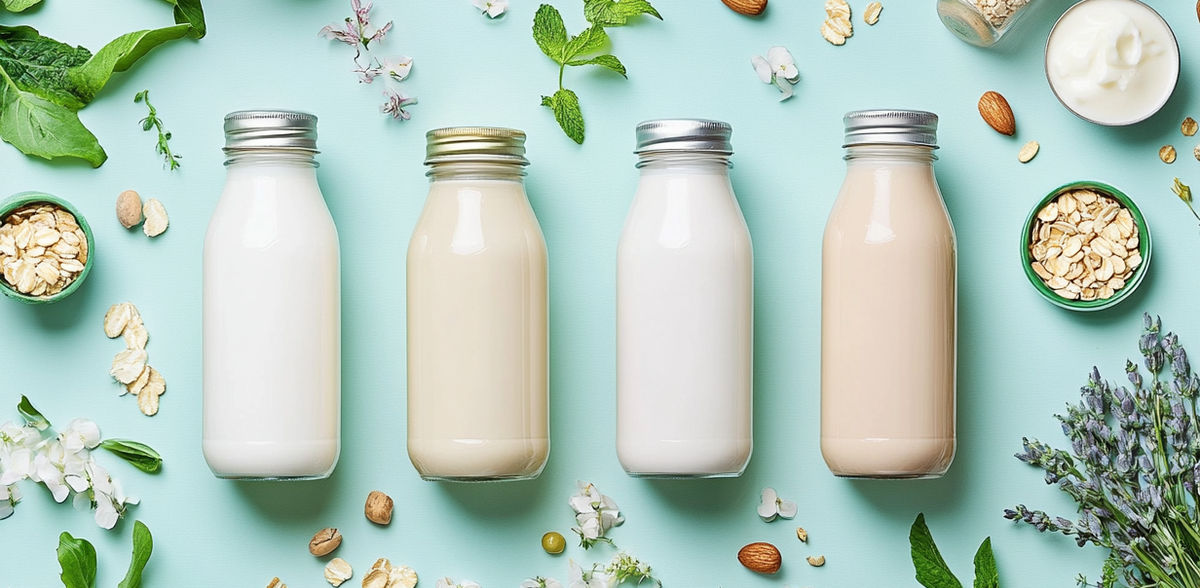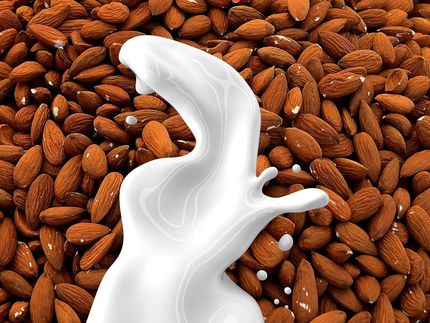New DGE position on plant-based milk alternatives: ProVeg takes a stand
Advertisement
The German Nutrition Society (DGE) published a position paper on cow's milk and plant-based milk alternatives yesterday.1 ProVeg nutrition expert Anna-Lena Klapp says: "The new DGE position on plant-based milk alternatives is a clear signal of the need for political support for plant-based alternative products in Germany."

Anna-Lena Klapp, Head of Nutrition & Health, ProVeg International.
Anna-Lena Klapp
DGE recognizes the normality of plant-based milk
The DGE is the German Nutrition Society and thus the reference for professional nutritional advice and for menu planning in communal catering in schools, universities and company canteens. In the past, the DGE only recommended cow's milk and cow's milk products to cover nutrients such as calcium. Anna-Lena Klapp finds it remarkable that it now also advocates plant-based milk alternatives. "The DGE's new position is a decisive step towards the institutional normalization of plant-based milk alternatives in Germany," says Klapp.
In its paper, the DGE takes into account that some people consume little or no cow's milk, while others consume more than recommended. "The DGE recognizes the actual consumption behaviour of the population and is finally making concrete recommendations for action for the first time," praises Klapp. The position paper emphasizes two important core arguments for plant-based milk alternatives: The products can make it easier to implement a plant-based diet, as they increase the range of plant-based foods available. In addition, the environmental impact of their production is generally lower than that of cow's milk production.
ProVeg: Specific recommendations for manufacturers and consumers
ProVeg agrees with the DGE that plant-based milk alternatives are only an adequate alternative to cow's milk if they are enriched with calcium, iodine, vitamin B2 and B12. ProVeg has been sensitizing consumers and manufacturers to this for a long time. "The fact that the DGE also points out the importance of fortification not only serves consumer orientation, it is also an emphatic signal to the manufacturers of plant-based milk alternatives," emphasizes Klapp. Nevertheless, she is not entirely satisfied: "I would like to see even more precise fortification recommendations for manufacturers, such as those already provided by the Dutch Nutrition Society."
Klapp is now calling for the official DGE recommendations - especially the "Milk and dairy products" group - and the DGE nutrition circle2 to be adapted and for plant-based milk alternatives to be included in line with the new position. At present, the recommendations on plant-based milk alternatives are still very vaguely formulated, and the chart does not take the products into account at all.
The Swedish Food Agency, for example, uses a plant-based symbol next to the milk glass.3 The British national dietary recommendations clearly refer to "soy milk" in their graphic.4 ProVeg would also like to see quantity recommendations with specific examples of plant-based alternatives: "For example, consumers should know how a portion of calcium-enriched soy milk contributes to their daily calcium requirement," explains Klapp.
New study: Good for blood lipids, blood pressure and inflammation
Plant milks have a long tradition in many cultures around the world. Nevertheless, more research is generally needed into the consumption of plant-based milk alternatives, as the widespread marketing of these products is newer than that of cow's milk, says Klapp.
A promising and comprehensive new publication, which probably did not make it into the DGE position paper due to its topicality, explains that replacing cow's milk with soy milk can have a positive effect on blood lipids, blood pressure and inflammation in adults.5 The authors of the study therefore conclude that foods such as fortified soy milk should be politically promoted for the switch to a healthy plant-based diet, for example through national dietary recommendations such as those of the DGE.
Sources
1 German Nutrition Society (2024): Cow's milk and plant-based milk alternatives - new DGE position paper, press release dated 12.09.2024. Online at: https://www.dge.de/presse/meldungen/2024/kuhmilch-und-pflanzliche-milchalternativen-dge-positionspapier/
2 German Nutrition Society: DGE Nutrition Group - Milk and dairy products, accessed on 13.09.2024. Online at: https://www.dge.de/gesunde-ernaehrung/gut-essen-und-trinken/dge-ernaehrungskreis/milch-und-milchprodukte/
3 Ingredients Network (2023): Swedish Food Agency updates food plate model to consider planetary health, published on 21.03.2023. Online at: https://www.ingredientsnetwork.com/swedish-food-agency-updates-food-plate-model-to-news120329.html
4 National Health Service (2022): The Eatwell Guide, updated on 29.11.2022. Online at: https://www.nhs.uk/live-well/eat-well/food-guidelines-and-food-labels/the-eatwell-guide/
5 Erlich, M. N., D. Ghidanac, S. Blanco Mejia et al. (2024): A systematic review and meta-analysis of randomized trials of substituting soymilk for cow's milk and intermediate cardiometabolic outcomes: understanding the impact of dairy alternatives in the transition to plant-based diets on cardiometabolic health, BMC Med 22, p. 336. Online at: https://doi.org/10.1186/s12916-024-03524-7
Note: This article has been translated using a computer system without human intervention. LUMITOS offers these automatic translations to present a wider range of current news. Since this article has been translated with automatic translation, it is possible that it contains errors in vocabulary, syntax or grammar. The original article in German can be found here.





























































